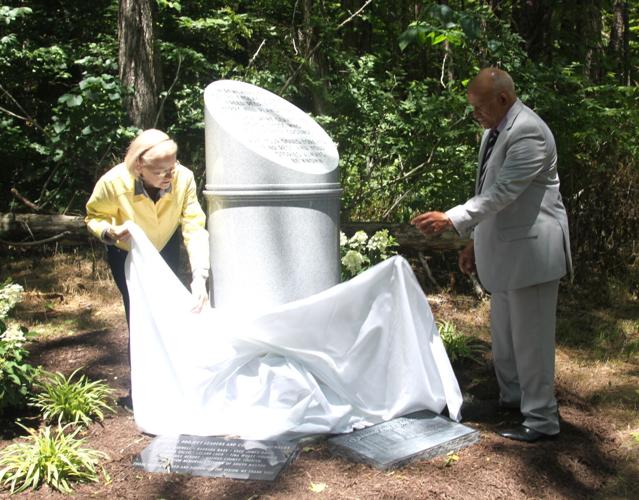A memorial for the souls buried at Diamond Hill Cemetery on the Berry Hill Plantation was unveiled Sunday.
On the hallowed grounds of Diamond Hill, more than 300 slaves who once worked at the Berry Hill Plantation were laid to rest. Their graves are mainly marked by fieldstones, and although many of their names are unknown, their memory will not be forgotten.
The granite memorial unveiled Sunday pays tribute to all of them with this engraved message: “In Remembrance of the Enslaved and Freed People of Berry Hill Plantation. This Monument Serves To Honor Those Who Toiled These Grounds. May Your Souls Forever Find Rest and Your Stories Always Be Known.”
Honoring the legacy of the slaves who toiled at the Berry Hill Plantation appropriately coincided with Juneteenth, a holiday that commemorates the day on June 19, 1865, when the enslaved African Americans of Galveston, Texas, found out they were free.
Among those buried at Diamond Hill are the ancestors of Rev. Cece Jones-Davis, a high school classmate of Lori Ashwell, visionary of the Diamond Hill Memorial. Jones-Davis could not attend the memorial service, but Ashwell read a letter she had written for the occasion.
“My heart overflows with joy that we today acknowledge the lives and stories of those strong amazing people whose names we may never know,” Jones-Davis wrote. “Today is about more than a monument. It is an overdue acknowledgement of a history that we cannot afford to forget. It is an affirmation that the lives of these people, their struggles and their triumphs mattered.”
Former South Boston town manager Ted Daniel added that although the names of many of those buried at Diamond Hill are unknown, the memorial is a way to ensure they are not forgotten.
“We can’t say their names, but this is what we can do: we can honor their dignity, we can show our care for them and we can show undying respect, and we do that by maintaining their final resting place,” Daniel said.
Descendants of those buried at Diamond Hill were among those in attendance at the memorial unveiling, among them Jean Winston, a descendant of the Duncan/Alderson family. Her great-grandmother, Lucy Alderson, married Darby Duncan, who was head chef for Berry Hill Plantation owners, Mr. and Mrs. James Bruce.
Halifax County supervisor William Bryant Claiborne also shared that his wife’s great-great grandmother is buried at Diamond Hill Cemetery. In his message at the Diamond Hill Memorial celebration, Claiborne stressed the importance of learning from the past to move forward as a united nation and community.
“We’re still fighting to become one nation under God. We’re supposed to be a nation united for the good and prosperity of our nation,” Claiborne said. “In order for us to effectuate change, we have to know what we have to change. We must not pick and choose what history is. In order to move forward, we have to know what happened in the past.”
Those in attendance at the Diamond Hill Memorial Celebration got glimpses of the past and what life was like for some of the slaves who worked at the Berry Hill Plantation. Berry Hill historian Leland Luck spoke the names of three of those individuals, so their memories would not be forgotten.
Their names are Darby Duncan, the Bruce Family’s talented chef who studied under the chefs of Louisiana, Bizzy, the Bruce Family’s housekeeper, and William Alexander Pamplin, James Bruce’s butler, a jack-of-all-trades who was a Baptist preacher that could also pull teeth, Luck related. After slavery was abolished and Pamplin was freed, Luck said Bruce gave Pamplin 30 acres of land to form what is now known as Washington City.
Bizzy refused to leave Berry Hill Plantation after she was told she was free, stating she was born at Berry Hill, it was her home, and it was where she would remain, Luck told the crowd at the memorial celebration. So Bruce built her a room in the back of the mansion, and she lived the rest of her life at the plantation.
“Say their names” is the catalyst that put the Diamond Hill Memorial in motion. Ashwell, whose family operates South Boston Memorials, shared the story of watching a grieving mother on the news speaking of her Black son being killed, and a young woman holding up a sign with the phrase “Say their names” on it. Ashwell immediately thought of those buried at Diamond Hill with nothing to honor their memory, and she knew what she needed to do.
Ashwell called her friend Tina Wyatt-Younger, former vice mayor of South Boston, and got her onboard with the project. The friends also reached out to Barbara Bass with the Halifax County Historical Society and Luck, and started to put the plan for the Diamond Hill Memorial in motion. Ashwell shed tears as she saw the memorial unveiled at Sunday’s celebration, looking at the words inscribed at the bottom of the granite memorial “faith,” “hope” and “love.”
“We chose the words ‘faith,’ ‘hope’ and ‘love’ because in reading about slavery and how their lives were, we felt that they were full of hope and in the faith that there were better days to come, and in doing that, they showed their love for their families and their community,” Ashwell explained.
Jones-Davis wrote in her letter that she hopes the memorial inspires everyone to build “better communities that promote peace, love and justice.”
Along with the inscriptions of “peace,” “hope,” and “love,” part of the memorial are plaques commemorating the dedication date of the Diamond Hill Memorial, listing the memorial project leaders and committee members, and listing the names of the Diamond Hill memorial donors.




